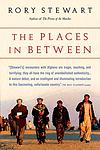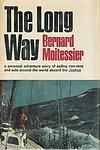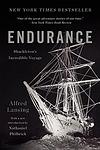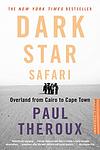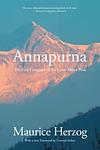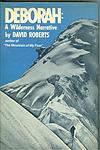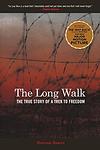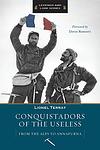The Greatest "Nonfiction, Adventure" Books Since 1950
Click to learn how this list is calculated.
This list represents a comprehensive and trusted collection of the greatest books. Developed through a specialized algorithm, it brings together 284 'best of' book lists to form a definitive guide to the world's most acclaimed books. For those interested in how these books are chosen, additional details can be found on the rankings page.
Genres
The Adventure genre is characterized by stories that take readers on thrilling journeys filled with danger, excitement, and unexpected twists and turns. These books often feature brave protagonists who embark on quests, explore new territories, and face challenges that test their physical and mental limits. Adventure stories can be set in any time period or location, from ancient civilizations to futuristic worlds, and can include elements of romance, mystery, and suspense. Whether it's a treasure hunt, a survival story, or a battle against evil forces, Adventure books offer readers an escape into a world of excitement and adventure.
Countries
Date Range
Reading Statistics
Click the button below to see how many of these books you've read!
Download
If you're interested in downloading this list as a CSV file for use in a spreadsheet application, you can easily do so by clicking the button below. Please note that to ensure a manageable file size and faster download, the CSV will include details for only the first 500 books.
Download-
1. The Great Railway Bazaar by Paul Theroux
"The Great Railway Bazaar" is a travelogue in which the author embarks on a four-month journey by train from London through Europe, the Middle East, the Indian subcontinent, Southeast Asia, and Siberia, and then back to Europe. The book is a vivid and insightful account of the people, cultures, landscapes, and experiences encountered during the journey, painting a unique picture of the world as seen from the perspective of a train window. The author's sharp observations and engaging storytelling make this journey as much an inner exploration as a geographical one.
-
2. Into the Wild by Jon Krakauer
This striking narrative non-fiction tells the real-life story of a young man who turns his back on society to live in the Alaskan wilderness. Despite a privileged background and a promising future, he donates his savings to charity, abandons his car and most of his possessions, and embarks on a journey into the wild. His solitary existence in the wild, his struggles for survival, and his untimely death provide a profound exploration of the allure of wilderness and the human yearning for solitude and self-discovery.
-
3. Papillon by Henri Charrière
The book is a memoir that chronicles the harrowing experiences of a Frenchman who is wrongfully convicted of murder and sentenced to life in the penal colonies of French Guiana. Determined to regain his freedom, he makes numerous escape attempts, facing incredible odds and enduring brutal conditions. His indomitable spirit and will to survive lead him through a series of adventures and misadventures, including solitary confinement, a stint in a leper colony, and living with indigenous tribes. Throughout his ordeal, his nickname, derived from the butterfly tattoo on his chest, becomes a symbol of his unyielding quest for liberty.
-
4. Into Thin Air by Jon Krakauer
This gripping non-fiction book recounts the tragic events of the 1996 Mount Everest disaster. The author, a journalist and experienced climber, was part of a commercial expedition to summit Everest. The expedition soon turned disastrous due to a severe storm, leading to the death of several climbers from various teams. The book provides a vivid, personal account of the harrowing ordeal, detailing the physical and psychological challenges faced by climbers at high altitudes, as well as the ethical and commercial aspects of mountaineering expeditions.
-
5. Seven Years in Tibet by Heinrich Harrer
This book is a travel memoir that recounts the author's escape from a British internment camp in India during World War II and his subsequent journey through the Himalayas to Tibet, where he becomes a tutor and friend to the Dalai Lama. The book provides a detailed account of Tibetan culture, customs, and the political turmoil leading up to the Chinese invasion, as seen through the eyes of a foreigner who spent seven years living there.
-
6. Arabian Sands by Wilfred Thesiger
This book is a detailed account of the author's travels across the Arabian Peninsula during the 1940s. The narrative provides an in-depth look into the Bedouin way of life, their customs, and the harsh desert environment they inhabit. The author's journey takes him through the Empty Quarter, one of the most inhospitable places on earth, challenging his endurance and resilience. The book is a testament to the author's love for adventure and his admiration for the Bedouin people, offering readers a glimpse into a world that has largely disappeared.
-
7. Into The Heart Of Borneo by Redmond O'Hanlon
The book is an enthralling travelogue that recounts the daring journey of two adventurers as they embark on an expedition into the dense rainforests of Borneo. With a blend of humor and erudition, the narrative captures their encounters with the island's unique wildlife, challenging terrain, and the indigenous Dayak people, whose customs and way of life are as intriguing as the natural wonders surrounding them. The travelers face numerous hardships and moments of awe, providing a vivid account of their quest to reach the center of one of the world's last great wildernesses.
-
8. In Xanadu by William Dalrymple
"In Xanadu" is a travelogue that follows the journey of a young historian and writer as he retraces Marco Polo's route from Jerusalem to the fabled city of Xanadu in Mongolia. Along the way, the author weaves together a rich tapestry of history and adventure, engaging with diverse cultures and landscapes. His travels take him through the Middle East, South Asia, and into the heart of China, offering insights into the complex interplay between past and present, and the enduring allure of one of history's most legendary journeys. The narrative is as much a personal coming-of-age story as it is a homage to the spirit of exploration and discovery.
-
9. The Places In Between by Rory Stewart
"The Places In Between" is a memoir by Rory Stewart about his journey on foot across Afghanistan in 2002, shortly after the fall of the Taliban. He travels from Herat to Kabul, encountering a variety of people and landscapes along the way. The book provides a unique insight into the culture and history of Afghanistan, as well as the challenges faced by the country in the aftermath of war. Stewart's writing is both lyrical and informative, making for a compelling read.
-
10. The Long Way by Bernard Moitessier
The book is a captivating narrative of a sailor's solo circumnavigation of the globe during a historic yacht race. Rejecting the trappings of fame and competition, the sailor chooses to continue sailing beyond the finish line, embracing the sea's vastness and his deep connection with nature. His journey becomes not just a test of physical endurance but a spiritual quest, as he reflects on life, the modern world, and the harmony found in simplicity. Through storms, wildlife encounters, and the solitude of the open ocean, the sailor's tale is a profound meditation on the human spirit and our relationship to the Earth.
-
11. Slowly Down The Ganges by Eric Newby
This travelogue recounts the author's adventurous journey down the Ganges, one of the great rivers of the Indian subcontinent. With humor and keen observation, the narrative captures the diverse landscapes and vibrant cultures encountered along the riverbanks. Through a series of mishaps, challenges, and encounters with local inhabitants, the author paints a vivid picture of life in India, reflecting on its history, religion, and the profound significance of the river to the people who live along its course. The book is as much a personal quest as it is an exploration of a place and its people, offering insights into the complexities of a rapidly changing country while navigating the waters of one of its most sacred rivers.
-
12. Endurance by Alfred Lansing
The book chronicles the harrowing voyage of the British Imperial Trans-Antarctic Expedition, led by Sir Ernest Shackleton, which set sail in 1914 with the goal of making the first land crossing of the Antarctic continent. However, their ship, the Endurance, became trapped and then crushed by pack ice in the Weddell Sea, leaving the crew stranded. The narrative vividly recounts the crew's extraordinary feat of survival as they endured the brutal Antarctic conditions for months on end, facing extreme cold, starvation, and isolation, before managing a daring escape in lifeboats to reach safety. It is a remarkable tale of leadership, perseverance, and the indomitable human spirit in the face of overwhelming adversity.
-
13. In Patagonia by Bruce Chatwin
In this travelogue, the author embarks on a journey through the remote and enigmatic region of Patagonia, located at the southern tip of South America. Blending history, legend, and personal anecdotes, the narrative weaves through the diverse landscapes and cultures of the area, as the author encounters a cast of intriguing characters, from outlaws to settlers, all while searching for traces of its storied past. The book is as much an exploration of the author's wanderlust and love for adventure as it is a portrait of the rugged, windswept terrain and the resilient spirit of the Patagonian people.
-
14. No Mercy by Redmond O'Hanlon
The book is a riveting travelogue that follows the author's harrowing journey into the depths of the Congo Basin, seeking to uncover the truth behind the legends of a dinosaur-like creature said to inhabit the region. Accompanied by a motley crew of scientists and adventurers, the author battles the relentless forces of nature, encounters a myriad of dangerous wildlife, and grapples with the psychological strains induced by the harsh and unpredictable environment. The narrative is as much an exploration of the human spirit and the bonds formed in extreme circumstances as it is a quest for a mythical beast, all told with a blend of humor, vivid description, and keen anthropological insight.
-
15. Shadow Divers by Robert Kurson
This non-fiction book chronicles the dangerous and suspenseful adventure of two deep-sea wreck divers who, in 1991, discovered a sunken German U-boat off the coast of New Jersey. Despite the risks and the skepticism of experts, the divers became obsessed with identifying the seemingly untraceable submarine. Their quest for answers led them to delve into historical records and put their lives on the line during numerous dives, ultimately revealing the U-boat's identity and bringing closure to a long-lost chapter of World War II history. The story is a testament to the power of curiosity, perseverance, and the human spirit's drive to solve the mysteries of the past.
-
16. Dark Star Safari by Paul Theroux
In this travel memoir, the author recounts an overland journey across Africa, starting from Cairo and ending in Cape Town. Along the way, he traverses a continent rich with diverse cultures, landscapes, and histories, while also confronting the stark realities of poverty, political turmoil, and the complex legacies of colonialism. His encounters with aid workers, missionaries, and locals provide a nuanced perspective on the challenges and beauty of Africa, as well as a critical look at the effects of foreign aid and development. The narrative is a blend of adventure, reflection, and social commentary, revealing the author's deep fascination with the continent and its people.
-
17. Along The Ganges by Ilija Trojanow
The book is a travelogue that takes the reader on a captivating journey along the sacred Ganges River, from its source in the Himalayas to its delta in the Bay of Bengal. The narrative is rich with descriptions of the diverse landscapes, cultures, and people encountered by the author. It delves into the profound spiritual significance of the river to millions of Hindus, as well as the contemporary challenges it faces due to pollution and modernization. Through personal reflections and encounters, the author explores the complex relationship between the river and the civilization it has nurtured for centuries, offering insights into the historical, religious, and ecological aspects of this iconic waterway.
-
18. Annapurna by Maurice Herzog
This book recounts the incredible true story of a French expedition to the Himalayas in the early 1950s. The team, led by an experienced mountaineer, faces extreme weather conditions, challenging terrains, and life-threatening situations in their quest to conquer the Annapurna peak. Despite losing fingers and toes to frostbite, the leader becomes the first person to reach the summit of an 8,000-meter peak, marking a significant milestone in mountaineering history. The narrative is not just about the physical journey but also delves into the psychological and emotional struggles of the climbers.
-
19. The Mountain of My Fear by David Roberts
"The Mountain of My Fear" is a gripping account of a mountaineering expedition that turns tragic. The narrative follows a group of four friends who set out to conquer an unclimbed peak in Alaska. Their journey is filled with treacherous challenges and personal growth. However, the adventure takes a dark turn when one of them falls to his death. The story is not just about the physical climb, but also about the psychological and emotional journey, exploring themes of fear, guilt, and the complex dynamics of friendship.
-
20. A Wilderness Narrative by David Roberts
"A Wilderness Narrative" is an engaging account of a man's journey through the American wilderness. The author vividly describes his experiences and observations as he treks through various landscapes, including mountains, forests, and deserts. The book serves as a reflection on the relationship between humans and nature, exploring themes of solitude, survival, and the sublime beauty and harsh realities of the natural world. It's a compelling exploration of the American wilderness and the profound impact it can have on the human spirit.
-
21. Everest: The West Ridge by Thomas Hornbein
This book is a firsthand account of a daring and historic climb of Mount Everest via the treacherous West Ridge - a route that had never been successfully ascended before. The narrative vividly describes the extreme physical and mental challenges faced by the climbers, the breathtaking beauty of the Himalayas, and the camaraderie and teamwork that was essential for survival. The author's detailed and compelling recounting of the expedition offers an intimate look at the perils, triumphs, and the sheer magnitude of human endurance in one of the harshest environments on Earth.
-
22. K2 The Savage Mountain by Charles Houston, Robert Bates
"K2 The Savage Mountain" is a gripping account of the 1953 American expedition to the world's second highest, yet most difficult to climb mountain, K2. The authors, who were part of the expedition, chronicle their team's heroic struggle for survival against harsh weather conditions, a dwindling supply of oxygen and food, and the mental and physical toll of climbing at such high altitudes. The book provides a detailed and harrowing insight into the world of mountaineering and the relentless determination required to conquer such formidable peaks.
-
23. The Long Walk by Slavomir Rawicz
"The Long Walk" is a harrowing narrative of a group of prisoners who escape from a Siberian gulag during World War II, and undertake a treacherous journey through the harsh Siberian wilderness, the Gobi desert, the Himalayas, and finally to India. The story is based on the author's own experiences and portrays the indomitable human spirit, survival against all odds, camaraderie, and the will to freedom.
-
24. Alive by Piers Paul Read
"Alive" is a gripping true story of survival, recounting the harrowing ordeal of a Uruguayan rugby team whose plane crashes in the Andes mountains in 1972. Stranded for over two months in the harsh, freezing wilderness, the survivors face unimaginable hardships, including avalanches, starvation, and the devastating decision to resort to cannibalism to stay alive. The book is a testament to the strength of the human spirit and the will to survive against all odds.
-
25. Conquistadors of the Useless by Lionel Terray
"Conquistadors of the Useless" is a riveting memoir of a renowned mountain climber, sharing his thrilling experiences in the world of mountaineering. The book takes the reader on a journey through some of the most challenging and dangerous climbs, including the first ascents of Annapurna and Makalu. The author also provides a profound insight into the psyche of climbers, the risks they take, and the reasons behind their seemingly irrational passion for climbing. The book is not just about climbing but also about the human spirit and its relentless pursuit of achievement.
Reading Statistics
Click the button below to see how many of these books you've read!
Download
If you're interested in downloading this list as a CSV file for use in a spreadsheet application, you can easily do so by clicking the button below. Please note that to ensure a manageable file size and faster download, the CSV will include details for only the first 500 books.
Download







